Top 10 Material Recommendations

If you are planning to renovate your kitchen or are designing a new space altogether, it can be overwhelming to decide what material is best for your home. Each material is unique and has a different set of advantages and disadvantages. Some countertop materials are better at resisting scratches while others are great at standing up against moisture or high temperatures. Keep reading to learn our top 10 kitchen countertop material recommendations and some additional information about each option. Choosing a surface doesn’t have to be stressful when you consider the pros and cons of each surface!
Granite
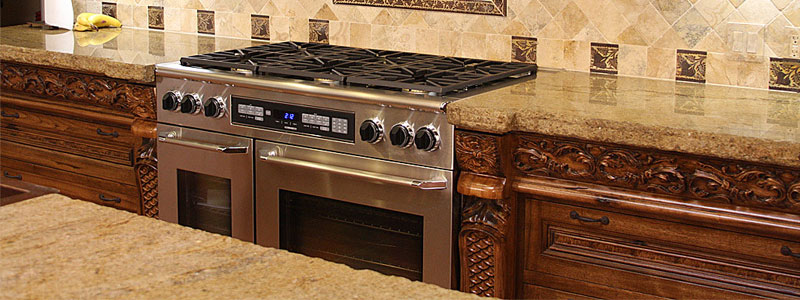
An extremely popular countertop material, granite is known for bringing beauty and elegance where it is installed. There are virtually unlimited design choices with granite and the surface offers resistance to both heat and stains. While it is often considered an expensive option, the price of granite is lower than in past years. It has become an affordable option for kitchen countertops and has also grown in popularity due to the incredible simple maintenance.
Pros:
- Increased home value
- Resistant to heat and stains with proper sealants
- Countless color and design options available
- Simple to maintain and no costly upkeep
- Longevity, these surfaces can last for decades
Cons:
- Surface may need sealing to resist damages
- Improperly sealed surfaces can hold bacteria
- Expensive compared to other materials
- May crack or chip with an improper installation
- Granite can dull knives and kitchen blades
Marble

Many homeowners choose marble for their kitchen countertops due to the unique finish of every slab! No two pieces of marble are alike, meaning your countertops will be a one-of-a-kind work of art. The stone is also unique in that it is softer than other options, giving it an elegant appearance. Marble can be easily identified by the signature veins in the stone that can range from shining whites to beautiful grays.
Pros:
- Unique veins in the stone give an elegant appearance
- Each slab is different and one-of-a-kind
- More flexible than granite
- Soft but resistant to heat
- Increased home value
Cons:
- Susceptible to scratches and staining
- Can be difficult to repair
- Must be professionally installed
- High price tag for materials
- Unable to use as a surface for cutting or chopping
Laminate
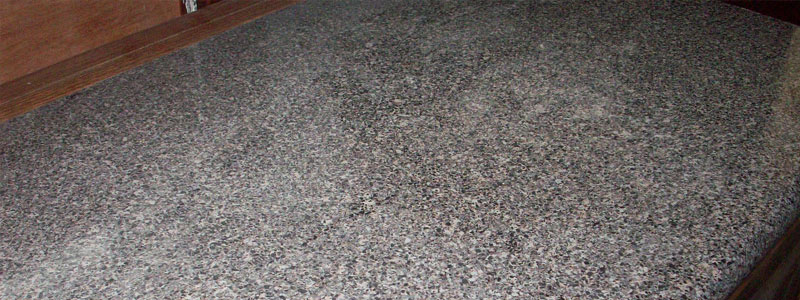
Laminate is a material that is popular with many homeowners due to its incredibly affordable cost and ease of maintenance. The cost for materials and installations is much lower than other options like stone and many are surprised to learn that the surface is incredibly strong! The strength of this material can be compared to that of granite, marble, or quartz. Laminate is often referred to by brand names such as Formica and Wilsonart.
Pros:
- Inexpensive cost for materials and installation
- Can be completed as a DIY project
- Easy surface to clean and maintain
- Countless color and design patterns available
- Heat resistant in short time frames up to 275°F
Cons:
- May not appeal to home buyers
- Surface is easily scratched or chipped
- Very difficult material to repair
- Delamination, the separation of layers, can occur over time
- Visible seams can affect the appearance
Soapstone
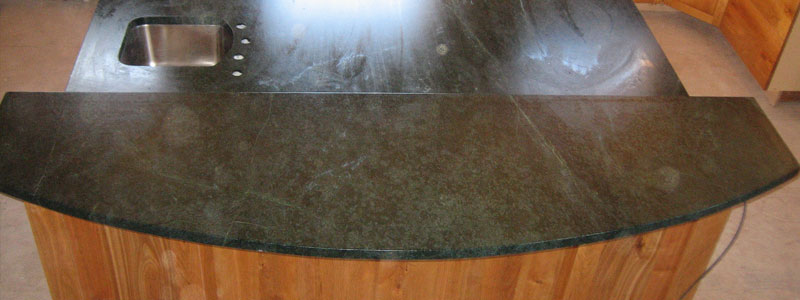
Soapstone is an incredibly popular natural material, as it is crafted from quarried stone. The surface finish of this material is known for being milky and different shades of gray while still holding the feel of natural stone. Soapstone is often seen in historical homes and the appearance of the stone is known to change and appear more authentic over time. The surface is strong and can withstand a lot of use, though it may become scratched due to the softness of the stone.
Pros:
- Excellent heat resistance
- Simple to repair minor surface damage
- Provides a historical and antique appearance
- Stunning natural stone gray color and milky finish
- Nonporous so easy to clean
Cons:
- Appearance can change over time
- Soft qualities of stone can lead to scratches or dents
- Needs mineral oil treatments
- Resistant to most staining but oil or wine may cause stains
- Limited color selection
Solid Surface
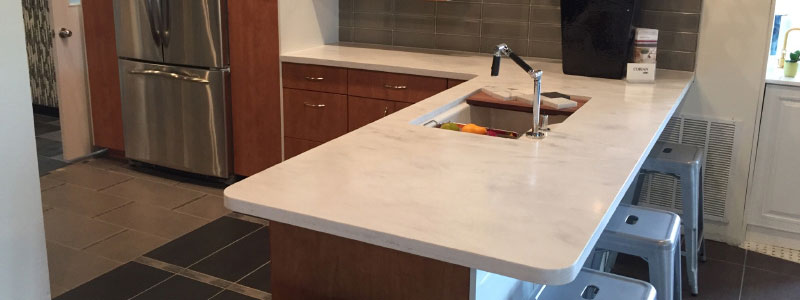
These types of countertops are extremely popular among homeowners due to the wide array of benefits associated with this material. Solid surface countertops are known best for being incredibly strong and resilient, with the ability to stand up against even the most damaging factors. These acrylic-resin surfaces are available in many different colors and design patterns, making them a great choice for those who like a bold countertop.
Pros:
- Virtually seamless
- Practically endless color and design options
- Resists damage from stains, water, and scratches
- Easy to sand out any damage
- Incredibly simple to care for
Cons:
Not resistant to heat or hot pans
- Materials can be expensive
- Needs mineral oil treatments
- Should not be used as a surface for cutting
- May be weak to impact
Quartz
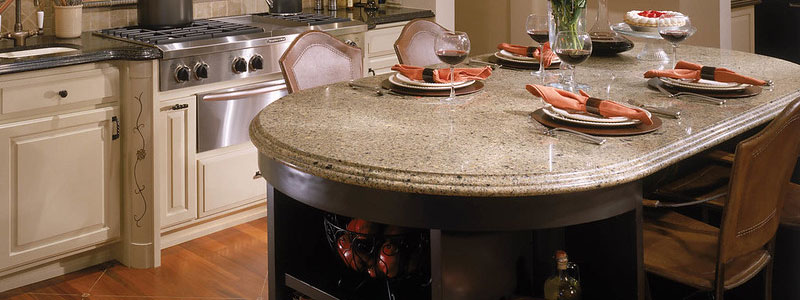
The countertop material known as quartz is different from soapstone and other quarried materials, as it is a product that contains up to 90 percent quartz particles and minerals. Quartz is known as a countertop material comparable to marble or granite, though it performs better and is available in a wider variety of colors and designs. Homeowners opt for this material due to the ease of maintenance and the similar appearance to that of marble.
Pros:
- Can be DIY installed with proper precautions for material weight
- No maintenance sealants needed
- Can be customized for shape and design
- Resists most damaging factors
- Non Porous surface means fewer bacteria
Cons:
- Limited sink options
- Extremely heavy materials
- Materials can be expensive
- Can be damaged by excessive heat
- Should only be used indoors
Butcher Block/Wood
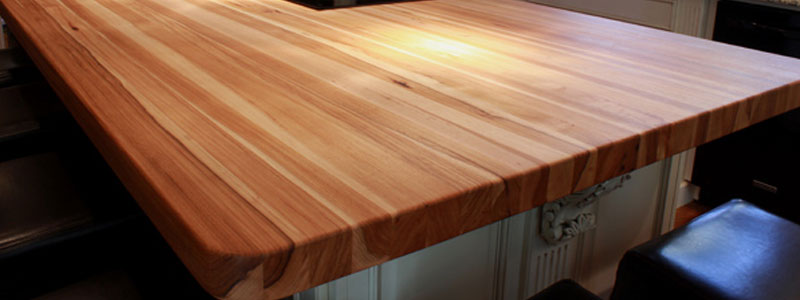
These types of countertops are common in homes where people prepare a lot of meals and utilize their kitchen space for a lot of cooking. The modern appearance of wood countertops is appealing to some homeowners and is available in many colors and finishes. Some of the most common materials used for these countertops are maple, cherry, and walnut.
Pros:
- Can last for decades
- Possible to sand and refinish for a new look
- Great for chefs and those who love to cook
- Able to withstand damage
- Simple to clean and maintain
Cons:
- Bacteria and mold can grow if not properly cleaned
- Needs sanding and oiling to prevent damage
- Materials can be expensive
- Water may cause damage to wood
- Can show wear from knives and blades
Stainless Steel

Stainless steel countertops are an excellent choice for homeowners who are looking for a sleek and incredibly modern aesthetic in their kitchens. This material is extremely durable and can withstand heat, moisture, and many more factors. Stainless steel is known for being very easy to clean and can last for many years. Homeowners can not only benefit from longevity but also the increase in home value.
Pros:
- One of the easiest materials to maintain, simple to clean and remove grime
- Will not be damaged by heat or hot pans
- Increases home value and appeals to homebuyers
- Provides a clean and modern aesthetic
- Will not rust or become faded
Cons:
- Materials can be expensive
- Can be loud with pots, pans, and dinnerware
- Surface can become scratched
- Must be professionally repaired
- Noticeable fingerprint smudges
Ceramic Tile
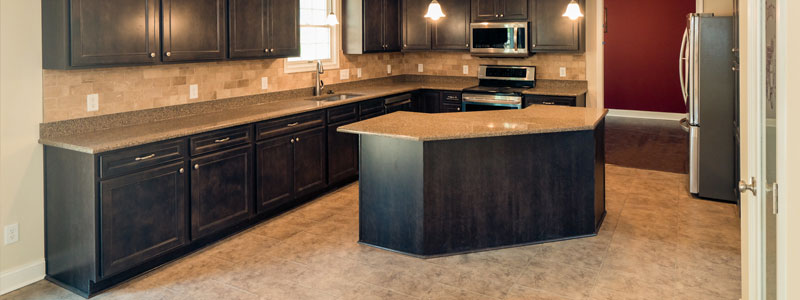
This material is a popular choice among homeowners who enjoy doing DIY and at-home projects. Ceramic tiles can be easy to install with some practice, are easy to clean, and come in a variety of different colors and patterns. It is also possible to match your countertop with the backsplash or to create two different patterns for a pop of color. The possibilities are endless when you choose ceramic, or even porcelain, tiles for your kitchen countertops.
Pros:
- Endless design variety, you can easily create patterns or unique layouts
- No need to replace the entire surface, one tile can be removed at a time
- Simple to clean and maintain
- Will not be damaged by hot pans
- Great for a DIY project
Cons:
- Not durable and can become cracked from impact
- Grout lines can become stained
- Custom tiles can have a large price tag
- Can harbor bacteria and molds
- Must be glazed or sealed to resist stains
Concrete

Concrete countertops are boosting in popularity for their customizable options and ability to fit nearly any layout. What makes these countertops so appealing to homeowners is their ability to be molded to fit odd or unusual shapes and sinks. The concrete material is different from that used outdoors, which is why the final product is so visually stunning and reflective. It’s common to see these types of countertops in modern or sophisticated environments.
Pros:
- Can be acid stained for a unique finish
- Resistant to heat, scratches, and cracking
- Sleek and modern aesthetic
- Bright and reflective surface
- Textures and additives are available
Cons:
- Must be professionally installed
- May not appeal to all home buyers
- Must be sealed to prevent staining or moisture damage
- High material and installation costs
- Resealing every 1-5 years
